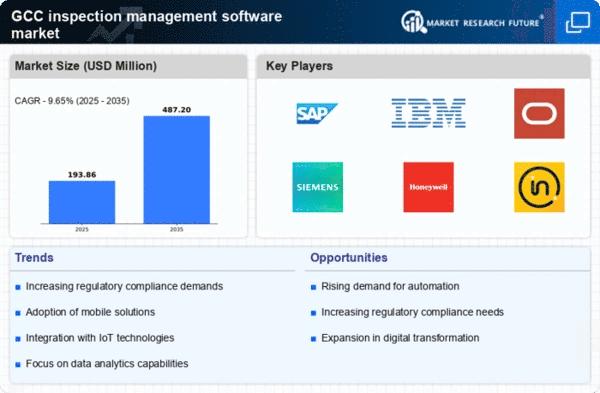Growing Regulatory Requirements
The inspection management-software market is being propelled by the growing regulatory requirements within the GCC. As governments and regulatory bodies impose stricter compliance standards across various industries, organizations are compelled to adopt software solutions that ensure adherence to these regulations. This trend is particularly pronounced in sectors such as oil and gas, where compliance with safety and environmental regulations is paramount. The market is witnessing an increase in demand for software that can automate compliance tracking and reporting, thereby reducing the risk of penalties and enhancing operational integrity. It is estimated that the adoption of inspection management software can lead to a 40% improvement in compliance rates, making it an essential tool for businesses aiming to navigate the complex regulatory landscape effectively.
Emphasis on Data-Driven Decision Making
In the current landscape, the inspection management-software market is increasingly influenced by the emphasis on data-driven decision making. Organizations in the GCC are leveraging data analytics to enhance their inspection processes, leading to improved outcomes and reduced risks. The ability to collect, analyze, and interpret data in real-time allows businesses to make informed decisions that can significantly impact their operational efficiency. For instance, companies utilizing inspection management software report a 25% increase in the accuracy of their inspections, which directly correlates with better compliance and safety standards. This trend indicates a shift towards a more analytical approach in managing inspections, thereby driving the demand for sophisticated software solutions that can handle complex data sets and provide actionable insights.
Rising Demand for Operational Efficiency
The inspection management-software market is experiencing a notable surge in demand for operational efficiency across various sectors in the GCC. Organizations are increasingly recognizing the need to streamline their inspection processes to reduce costs and enhance productivity. This trend is particularly evident in industries such as construction and manufacturing, where the implementation of software solutions can lead to significant time savings. According to recent data, companies that adopt inspection management software can achieve up to 30% reduction in operational costs. This drive towards efficiency is compelling businesses to invest in advanced software solutions that facilitate real-time data collection and analysis, thereby improving decision-making and resource allocation. As a result, the inspection management-software market is poised for substantial growth as organizations seek to optimize their operations.
Increased Focus on Safety and Risk Management
The inspection management-software market is increasingly driven by a heightened focus on safety and risk management within various industries in the GCC. Organizations are recognizing the critical importance of maintaining high safety standards to protect their workforce and assets. As a result, there is a growing demand for software solutions that facilitate comprehensive risk assessments and safety inspections. The ability to conduct thorough inspections and document findings in real-time is becoming essential for businesses aiming to mitigate risks effectively. Data indicates that companies utilizing inspection management software can reduce workplace incidents by up to 20%, underscoring the software's role in enhancing safety protocols. This focus on safety is likely to continue influencing the market, as organizations prioritize the well-being of their employees and compliance with safety regulations.
Technological Advancements in Inspection Processes
Technological advancements are significantly shaping the inspection management-software market, particularly in the GCC region. Innovations such as artificial intelligence (AI) and machine learning are being integrated into inspection software, enhancing the accuracy and efficiency of inspections. These technologies enable predictive analytics, which can foresee potential issues before they arise, thus minimizing downtime and maintenance costs. The market is witnessing a shift towards more sophisticated solutions that not only streamline inspection processes but also provide valuable insights for future improvements. Companies that adopt these advanced technologies are likely to see a competitive edge, as they can respond more swiftly to inspection findings and implement corrective actions. This trend suggests a robust growth trajectory for the inspection management-software market as organizations seek to leverage technology for enhanced operational performance.
















